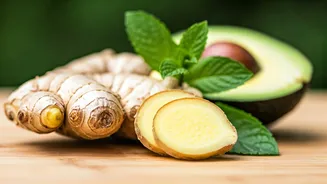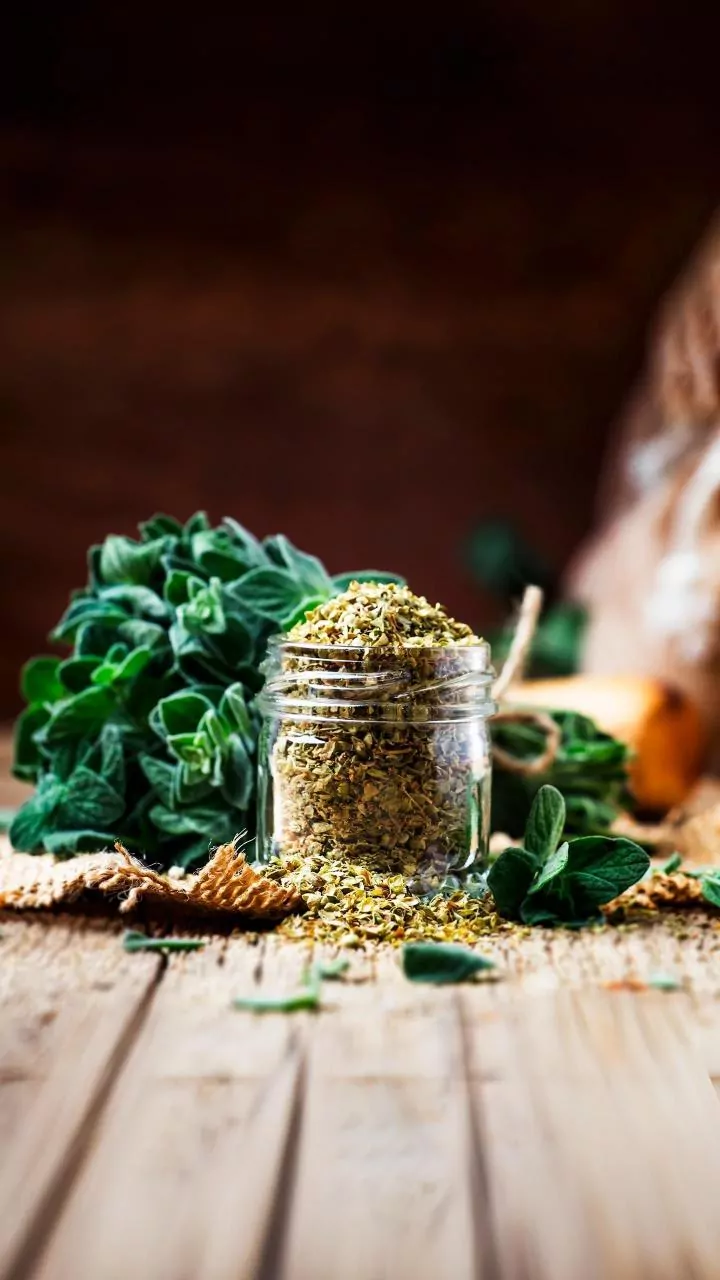Ginger's Digestive Aid
Ginger is a long-standing remedy for various digestive issues, and its effectiveness in combating bloating is well-documented. This root contains gingerol,
a compound known for its anti-inflammatory properties, which helps soothe the digestive tract and reduce gas. The consumption of ginger can stimulate digestive enzymes, thereby improving the breakdown of food and easing the process of digestion. It also helps in relaxing the muscles of the intestines, thereby reducing the painful sensation caused by gas accumulation. Incorporating ginger into your diet is simple; it can be added to meals, consumed as tea, or taken in supplement form.
Peppermint's Soothing Touch
Peppermint is another potent natural remedy for bloating, especially because of its ability to relax the muscles in the digestive tract. The main active compound, menthol, helps alleviate gas and bloating by reducing spasms in the gut. Peppermint oil, in particular, can be effective in reducing irritable bowel syndrome (IBS) symptoms, including bloating, by relaxing the smooth muscles of the intestines. You can consume peppermint as tea, which provides a calming effect, or incorporate peppermint oil supplements into your diet, following recommended dosages to maximize benefits.
Fennel Seeds for Relief
Fennel seeds are a traditional remedy for bloating and are widely used in many cultures for digestive health. These seeds contain compounds that help relax the gastrointestinal tract muscles, aiding in the release of trapped gas. Chewing fennel seeds after meals can boost digestion and reduce bloating. They have the ability to increase the production of bile, which helps in efficient fat digestion. Incorporating fennel into your diet can be as simple as adding the seeds to your recipes, drinking fennel tea, or even just chewing a teaspoon of the seeds after meals to gain the advantages.
Bananas: Potassium's Power
Bananas are known for their high potassium content, which can help regulate sodium levels and thereby reduce bloating. Sodium retention can contribute to water retention, and as a result, bloating. Potassium helps balance this by drawing excess fluid from the body. Bananas also contain fiber, which helps promote regular bowel movements and can prevent constipation, a common cause of bloating. Moreover, the natural sugars present in bananas offer a source of energy without causing additional digestive distress, making them a nutritious choice to combat bloating and promote overall digestive health.
Turmeric's Anti-Inflammatory Role
Turmeric, with its active compound curcumin, is a potent anti-inflammatory agent. Inflammation in the digestive tract can contribute to bloating and discomfort. Curcumin helps reduce this inflammation, thereby alleviating bloating. Turmeric also assists in the digestion process by stimulating the production of bile, similar to fennel seeds, which aids in breaking down fats. Adding turmeric to your diet, such as in curries or smoothies, not only offers its anti-bloating effects but also provides a host of other health benefits.
Papaya's Digestive Enzymes
Papaya contains the enzyme papain, which is well-known for its ability to aid in digestion. Papain helps break down proteins, making digestion easier and reducing the likelihood of gas and bloating caused by undigested food. Papaya also provides fiber, which promotes regular bowel movements and prevents constipation, both contributing to the reduction of bloating. Consuming fresh papaya or papaya juice can be a delicious and effective way to incorporate this fruit into your diet and support healthy digestion, lessening bloating and digestive distress.
Pineapple and Bromelain
Similar to papaya, pineapple contains enzymes, notably bromelain, that help in breaking down proteins, thereby aiding digestion. Bromelain has anti-inflammatory properties that can soothe the digestive tract, decreasing the inflammation often associated with bloating. By improving protein digestion, bromelain can help reduce gas production and bloating. Consuming pineapple, either fresh or as juice, can be a tasty and effective method to incorporate these beneficial enzymes into your diet, helping to relieve bloating and promote digestive comfort.
Watermelon's Hydrating Benefit
Watermelon is primarily composed of water and helps in hydration, which is essential for maintaining a healthy digestive system. Dehydration can lead to constipation, and consequently, bloating. Watermelon helps maintain proper hydration levels in your body, facilitating regular bowel movements and preventing bloating. It also contains natural sugars that provide energy without causing significant digestive upset. Eating watermelon offers a refreshing way to stay hydrated and support healthy digestion, thereby reducing bloating.
Cucumber for Hydration
Cucumbers, like watermelon, are high in water content, helping with hydration and thereby reducing bloating. Staying well-hydrated is critical for maintaining healthy digestive function and preventing constipation. Cucumbers offer a gentle source of fiber that promotes regular bowel movements, preventing the buildup of gas and bloating. Incorporating cucumber into your diet, such as by adding it to salads or consuming it as a snack, is an easy way to stay hydrated and support digestive health, contributing to a less bloated and more comfortable feeling overall.
Probiotic-Rich Yogurt's Role
Probiotic-rich yogurt introduces beneficial bacteria into your gut, which helps improve the balance of your gut microbiome. A healthy balance of gut bacteria can improve digestion, reduce gas production, and minimize bloating. Probiotics promote efficient digestion by aiding in the breakdown of food, helping to prevent the buildup of gas. Consuming probiotic yogurt, especially those with active cultures, can contribute to a healthier gut environment and lessen bloating. Regular intake of yogurt can be an effective and delicious way to support a balanced gut and alleviate digestive discomfort.




















